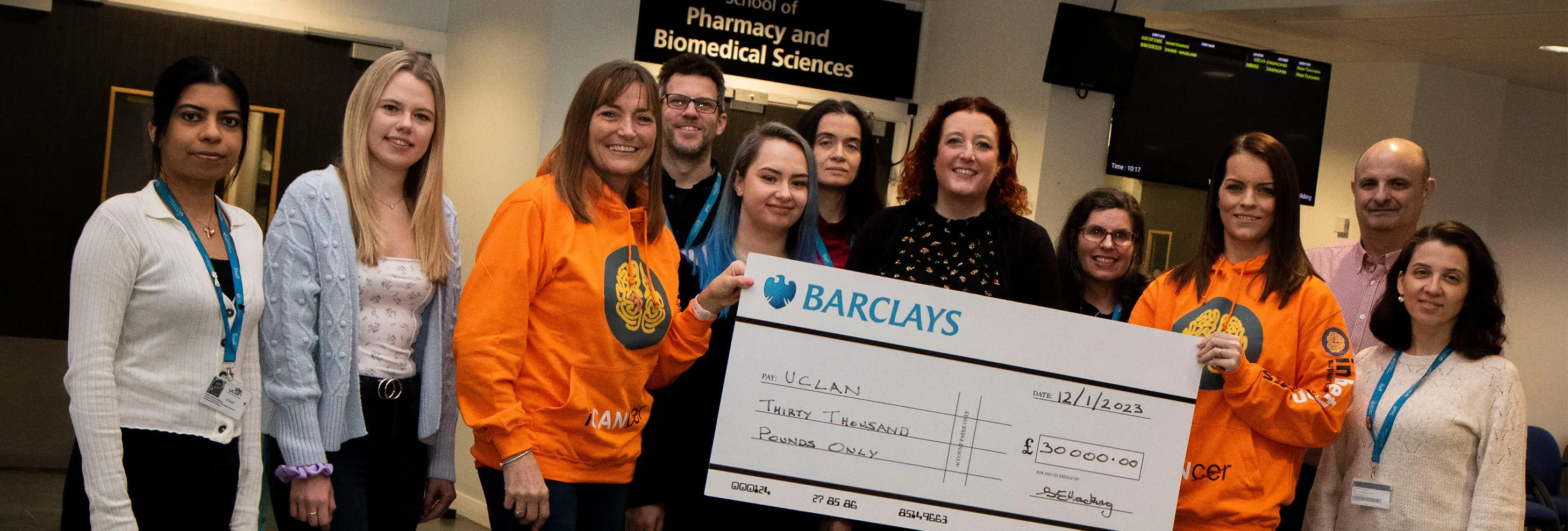Inbetweenears donates £30,000 to neuro-oncology research group at UCLan
A local charity has pledged its continued support of brain tumour research at the University of Central Lancashire (UCLan) by funding a second PhD student for the next three years.
Inbetweenears, a member charity of the national charity Brain Tumour Research, has worked with UCLan for the last 11 years to fund research projects. This week, the charity donated £30,000 to fund researcher Eleanor Taylor-Chilton to help find a cure for the biggest cancer killer of children and adults under the age of 40.
Dr Jane Alder, Deputy Head of School of Pharmacy and Biomedical Sciences at UCLan, said: “This amazing donation will be used to fund Eleanor to participate in a new collaboration called Gliomodel, set up by Dr Lucy Stead at the University of Leeds.
"Gliomodel will bring together eight universities, each with their own model. Working together we will be a resource for the whole glioma-community to research potential targets for treatment."
— Dr Jane Alder, Deputy Head of School of Pharmacy and Biomedical Sciences at UCLan
“The brain is such a complex organ and brain cancer is one of the most difficult diseases to treat, so it makes sense that if we are going to make any advances we need to work as research teams rather than individuals. Gliomodel will bring together eight universities, each with their own model. Working together we will be a resource for the whole glioma-community to research potential targets for treatment.”
The charity was set up by Jay Lynchehaun of Clitheroe after he was diagnosed with an aggressive glioblastoma multiform (GBM) brain tumour at the age of 25. Despite being told he only had six months to live, Jay lived his life to the full for another 10-years with his wife Becky and two children Teddy and Orla. Jay sadly lost his battle with brain cancer on the 7 March 2022.
"Jay was very positive about our work with the University and knew that although this research may not bring benefits in his lifetime, it will be vital for future generations."
— Sharon Hacking from Inbetweenears
Jay’s mum Sharon Hacking and his sister Jo visited UCLan to present a cheque.
Sharon said: “Jay’s lasting legacy and vision has enabled the neuro-oncology research group at UCLan to grow in strength and numbers. Jay was very positive about our work with the University and knew that although this research may not bring benefits in his lifetime, it will be vital for future generations.
“Currently less than 12% of those diagnosed with a brain tumour survive beyond five years, compared with an average of 50% across all cancers. I dearly hope that Eleanor’s research will help lead to a greater understanding of effective ways of treating patients.”
There are now 15 UCLan lecturers and researchers investigating potential new diagnostic techniques and treatments for people with a brain tumour.
The previous Inbetweenears sponsored research project supported UCLan student Klaudia Rzepecka to investigate the biology of the blood-brain barrier in a model that was made from human cells donated by patients who have undergone brain surgery. This model is now being used in several other brain tumour research projects in the lab.
"Historically just 1% of the national spend on cancer research has been allocated to brain tumours which is why they continue to kill more children and adults under the age of 40 than any other cancer."
— Sue Farrington Smith, chief executive of Brain Tumour Research
Sue Farrington Smith, chief executive of Brain Tumour Research, said: “Historically just 1% of the national spend on cancer research has been allocated to brain tumours which is why they continue to kill more children and adults under the age of 40 than any other cancer.
“It is heart-breaking that inspirational Jay, who set up Inbetweenears, passed away after exhausting all available treatments, leaving his young family without a husband and dad.
“Along with many of our Member Charities like Inbetweenears, Brain Tumour Research remains focused on our vision to find a cure for all brain tumours so that families are no longer devastated by this disease.”
More information about Brain Tumour Research is available online.

